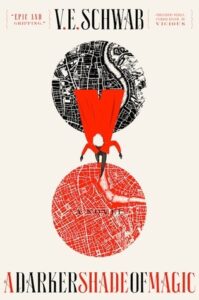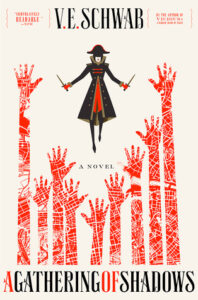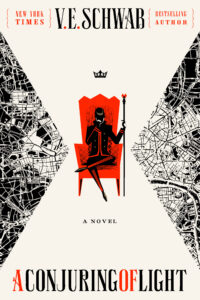By Jay Flood
In the summer of 2021, I read The Invisible Life of Addie LaRue by V.E. Schwab for the first time and fell in love with her writing style. I learned she had other published books that many people enjoyed, so I decided to read more of her books. I couldn’t decide which series to read first, but when a book club I participated in chose to read A Darker Shade of Magic, the first book in her Shades of Magic trilogy, for March, I took it as a sign.

There are four Londons: Red London, White London, Grey London, and Black London. A long time ago, dark magic took over Black London, threatening to wipe out the other Londons, too. The doors to each London were closed to protect the other Londons from Black London’s fate. The London we know is Grey London, where King George III rules, God is real, and magic is a myth. White London is a dangerous and desolate city where magic is power and the only way to have power is to take others’ magic. Instead of finding the balance of magic, they fight to control it, draining the color and warmth from everything and everyone. Red London is thriving, to say the least. Magic is valued and appreciated, everyone is taught to find a healthy balance, and magic is used for good.
No one travels between Londons anymore, except the two antari that are left: Kell, from Red London, and Holland, from White London. Kell was adopted by the royal family when he was five years old and while he does not consider the king and queen to be his parents, he does consider the prince, Rhy, to be his brother. Holland does not have a cozy life. He is controlled by the Danes twins who are the rulers of White London. Both antari deliver messages from their London’s rulers to the others. They are only allowed to bring letters between worlds, nothing else. But Kell is not a rule follower and likes to smuggle objects from the other Londons for himself.
When a White Londoner pays Kell to bring a letter to her only living relative in Red London, he finds two men waiting for him. He opens the letter and finds he has been tricked. Instead of a letter, a black stone is wrapped in a cloth. Kell flees to Grey London, knowing the black stone is a relic from Black London and he needs to make sure it doesn’t fall into the wrong hands. As soon as he gets to Grey London, he runs into a woman who steals the stone from him. Delilah Bard, a Grey London thief with no home and no family, refuses to give Kell the stone unless he takes her with him. He reluctantly agrees and they go back to Red London to figure out what to do next. However, the black stone has a dark magic of its own and can possess people. Holland is trying to steal the stone, the Dane Twins try to kill Rhy, and trouble is found around every corner.
Every book in this trilogy has multiple POVs which keep it interesting. It isn’t just Kell and Lila whose POVs we get, we read from Rhy, the queen, the king, random citizens, a captain, Holland, and so many others. Sometimes when books have too many POVs, the characters can blur together and be very similar. However, V.E. Schwab does an amazing job at distinguishing characters so that we know whose perspective it is based on their personality and tone alone. Each character feels so real and it’s hard not to connect with them. Honestly, my love for the characters is the only thing that got me through A Gathering of Shadows, the second book in the trilogy.

While I loved the first book and gave it four stars, A Gathering of Shadows put me in a reading slump for about two months. Very few trilogies are able to avoid what I call the second-book-slump, a phenomenon that occurs when the author uses the second book as build-up for the third without making the second book interesting in any other way. Examples of books that have avoided this are The Hunger Games trilogy, A Good Girl’s Guide to Murder trilogy, and The Selection Series. Unfortunately, the Shades of Magic trilogy was not able to avoid it. A Gathering of Shadows was more than 500 pages long, and the first 300 were fluff and filler. The next 150 pages were about the magic competition that takes place between three countries in Red London, which was fun but not captivating enough. The last 50 pages finally had a captivating conflict, but it left off on a cliffhanger because that established conflict was just build-up for the final book, A Conjuring of Light.
I finished the first book in five days and the third book in ten days. I began reading the second book on March 15 and when I had read over 300 pages and I felt like nothing was happening, it was really difficult for me to force myself to read. I cared about the characters, but after 300 pages of nothing happening, reading felt like a chore. From March 29 to May 30th I didn’t pick up that book at all. When I finally picked it up again, I finished it on June 1st. It does not ever take me two months to finish a book, but it is so difficult to want to read when nothing is happening, even if you love the characters.

After finally finishing the second one, I was really nervous to start the third because I didn’t want to read fluff or filler again. But to my surprise, the third book picked up right after the cliffhanger and was action-packed the entire book. I loved reading the first and third books and rated both of them four stars. However, even though I might like rereading the second book for the characters, I can’t in good conscience give a good rating to a book that put me in a reading slump for two months. On Goodreads, A Darker Shade of Magic has a 4.06 average rating, A Gathering of Shadows has a 4.23 average rating, and A Conjuring of Light has a 4.33 average rating. I am genuinely shocked that A Gathering of Shadows has a higher rating than A Darker Shade of Magic.
There are plenty of reasons people either liked the series or didn’t like it at all. Some of them I agree with, others I disagree with, and others I can see what they mean but I didn’t feel that way when reading the series.
If you read my post about the things that ruin would-be five-star books for me, you know I hate when romance takes over a book marketed as fantasy, science fiction, or dystopian. This book had the perfect amount of romance without it distracting from the conflict. The romance is subtle in the first book, more obvious but still a small part of the book in the second, and is more blatant in the third but still doesn’t distract from the actual conflict at all. I was very happy about how subtle the romance was and think all authors writing books that aren’t in the romance genre should take notes on how to incorporate romance without making it the entire plot.
A common reason one-star reviewers said they didn’t like the series was because of the characters. Firstly, the way the women are written in this series is a little misogynistic. For example, every woman is immediately judged by how she looks. The powerful women are all described as muscular and big and even questioned whether or not they are women. The only true feminine woman in the series is described as boy-crazy and spoiled. Lila Bard, one of the main characters, is described as “not like other girls” so many times in the series. She detests femininity and makes a big deal about not liking dresses and pretty things. It wouldn’t be misogynistic if they just described her like this without putting other girls down in the process. The implication of not being like “other girls” is that she is better because of it which feels like internalized misogyny.
Secondly, the one-star reviewers said Kell is boring. While I can see how they felt that way, I didn’t and still do not think Kell is boring. He is maybe a bit dull and could have been better if made a bit more interesting, but I still didn’t ever find him boring or dread reading chapters from his POV.
Finally, another character complaint is based on another common trope. They say that Rhy, the prince, and Alucard, a captain introduced in the second book who was born into a noble family, are both wealthy and powerful but complain about it and make it seem like it is a setback. I definitely agree that Alucard wanting to run away from wealth and power to be a captain on a ship seems like it fits that trope, but in the third book (spoilers) we learn that Alucard was forced away by his dad and brother when they found out he was sleeping with Rhy, a boy (homophobia exists in Red London too, I guess). Therefore, I don’t look at it as him complaining about wealth and power and the burdens of being a noble, I see it as him being forced out by his family for who he loves and deciding to stay away because he didn’t want to be with people like that. The argument that Rhy feeds into that trope is completely wrong, in my opinion. He only ever complains about not having magic and being scared he’s not going to be a good king because of it. But he worked his entire life strengthening other skills to make sure he is a good king. For example, he made it a point to learn the languages of not only the people in his country but the people in surrounding countries. Rhy always wanted to be a good king for his people and never wanted to run away from wealth and power, so I’m not sure why the one-star reviewers thought he fit that trope.
Another complaint that I do agree with is that most of the series is spent in Red London. Black London is only in one chapter, Grey London is present a little more, and White London should have been explored so much more than it was. Every scene with White London was so interesting and left me wanting to know more. It was disappointing that there were four Londons but three of them were wasted when there was so much more potential.
I really enjoyed the magic system in this series and thought it was very unique. However, I do think it could have been explored a bit more. There was a lot of unnecessary information, especially in the second book, that could have been replaced with more information about their world and the magic. I thought for sure we would learn more about how Black London was destroyed and how the doors were shut by other antari, but we didn’t. There were other smaller conflicts I wanted to be resolved or expanded upon but weren’t, which was disappointing.
While I did enjoy the series and loved the characters, I’m not sure I could confidently recommend the series to anyone without warning them about the second book. I do think after having finished the third book that it was worth it, but forcing myself to finish the second book was brutal and I don’t want to recommend it without warning. I really did love being in that world with its characters and magic system and I’m glad I read the series. I am looking forward to reading more V.E. Schwab books in the future.
